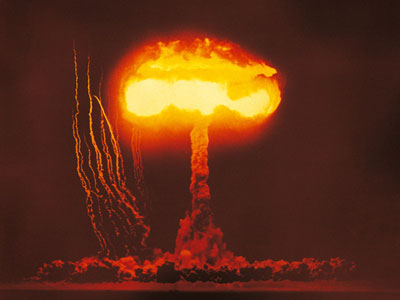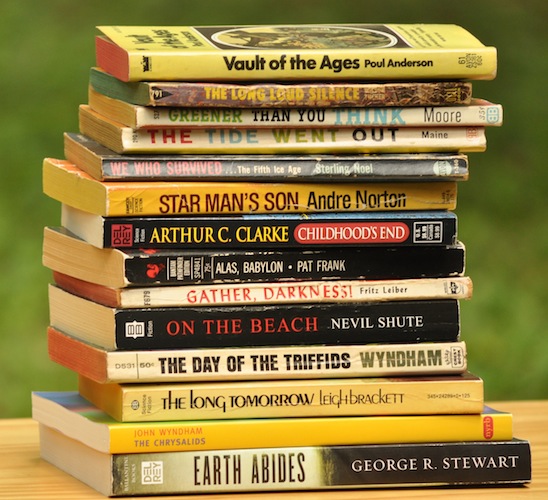Foremost, however, The Day of the Triffids is a great story, which Wyndham tells with a smooth, understated elegance that contrasts with the more sensationalist styles of some of his contemporaries. Wyndham can be shocking without becoming hysterical or excessively dramatic as he describes corpses, suicides, and the feeding habits of the man-eating plants. The playing-out of the horrifying situation he describes is effective enough, and doesn’t require prose that screams at you.
 The basic story is that a double catastrophe nearly wipes out humanity, and significantly, it’s not clear whether either of the two elements of the apocalypse are human technological screw-ups or natural disasters. It doesn’t really matter. Either way human beings have been knocked off their perch as the ruling species on the planet.
The basic story is that a double catastrophe nearly wipes out humanity, and significantly, it’s not clear whether either of the two elements of the apocalypse are human technological screw-ups or natural disasters. It doesn’t really matter. Either way human beings have been knocked off their perch as the ruling species on the planet. As we’re told by the narrator, who writes retrospectively from the new post-apocalyptic world order, the end began innocuously with the appearance of triffids, odd plants that yield a highly valued oil. It’s not clear where the triffids originated; perhaps out of a genetic engineering project in the Soviet Union. They spread worldwide when the seeds were dispersed high up in atmosphere, released by the destruction of a plane that was carrying them. Gradually people learned that the triffids could kill with a poisonous flail that shoots out of a cup at the top of their stems. Then it was discovered that triffids could walk, or at least shuffle, making them especially dangerous in the tropical areas where they could easily hide in ambush among the native flora.
But in Britain the triffids are under control - chained up, poison flails trimmed, and cultivated for their oil. Triffids are even kept as curiosities in gardens. Nobody is really worried about our ability to keep these dangerous plants under control, until catastrophe strikes - a freak meteor shower (or perhaps a nuclear battle in space among weaponbearing satellites, the latest result of the Cold War arms race) blinds everyone on the planet who watched it. With humanity disabled, the triffids move in, and, being plants, they show no mercy.
A few survivors eke out an existence on a small farm, where most of their effort is spent keeping the thousands of surrounding triffids at bay. (The survivors include a woman the narrator hooks up with, someone who just happens to have written a book called Sex Is My Adventure - no good Golden Age post-apocalyptic novel is complete without the potential seductress, as well as a discussion of the up and coming new polygamous order.)
 The triffids are utterly alien, completely emotionless, unreasoning, and driven by an intelligent instinct that people cannot wrap their minds around. In fact they’re not that different from other dangerous predators in nature, especially the non-mammalian ones most different from us - sharks, deadly snakes, Komodo dragons, tarantulas, etc. We have a tendency to humanize other creatures (think of how many talking vegetables, ducks, fish, etc. you’ve seen on TV in the last week), but in fact most living creatures are nothing like us. The triffids, whether genetically engineered or not, are totally inhuman, and represent nature at its most hostile.
The triffids are utterly alien, completely emotionless, unreasoning, and driven by an intelligent instinct that people cannot wrap their minds around. In fact they’re not that different from other dangerous predators in nature, especially the non-mammalian ones most different from us - sharks, deadly snakes, Komodo dragons, tarantulas, etc. We have a tendency to humanize other creatures (think of how many talking vegetables, ducks, fish, etc. you’ve seen on TV in the last week), but in fact most living creatures are nothing like us. The triffids, whether genetically engineered or not, are totally inhuman, and represent nature at its most hostile.Describing the pre-apocalyptic British countryside, which one could safely traverse without carrying weapons, the narrator tells his readers that “a world so tamed sounds utopian now.” The past technological society gives the impression of tremendous human progress, but in fact “the human spirit continued much as before - 95 percent of it wanting to live in peace, and the other 5 percent considering its chances if it should risk starting anything.”
 One of the survivors sums up this idea in a speech (the grand speech or lecture is another key element of the classic end of the world novel; in fact it seems to be an element of 1950’s sci-fi in general) - ever since August 6, 1945, humanity has been walking an ever-narrowing tightrope. A slip could could have meant the annihilation of the entire human race. The disastrous meteor shower and the invasion of the triffids may actually have been a good thing, because it prevented the total destruction caused by nuclear war. At least now the survivors stand a fighting chance of restoring humanity (now hopefully wiser) to its dominance of the planet.
One of the survivors sums up this idea in a speech (the grand speech or lecture is another key element of the classic end of the world novel; in fact it seems to be an element of 1950’s sci-fi in general) - ever since August 6, 1945, humanity has been walking an ever-narrowing tightrope. A slip could could have meant the annihilation of the entire human race. The disastrous meteor shower and the invasion of the triffids may actually have been a good thing, because it prevented the total destruction caused by nuclear war. At least now the survivors stand a fighting chance of restoring humanity (now hopefully wiser) to its dominance of the planet.And so, appropriately, the book ends with a declaration of war on the triffids, those “usurpers” of the planet, who will have to be utterly destroyed to render the world safe again for humanity, although just how humans, once restored, will avoid the pattern of mutually assured destruction this next time around is not clear.
The Day of the Triffids is deservedly a classic of the genre. Although generally lacking characters of much depth, it’s well written and engaging, a great story that comments on the precariousness of our planetary dominance.
Next up in our post-apocalyptic survey: the first of two picks for 1952, Wilson Tucker's: The Long Loud Silence, which is The Road of 1952.

Read the feed:




Comments